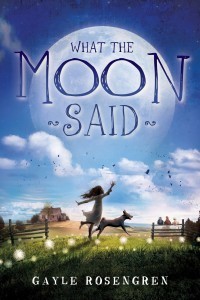Rochelle Melander's Blog, page 9
October 3, 2014
#WritersRead: Author Gayle Rosengren on Historical Fiction
I’m delighted to welcome Gayle Rosengren to the blog to talk about her favorite historical fiction books for middle grade readers. I met Gayle last spring at an SCBWI event, and was impressed by her knowledge of historical fiction. Gayle’s also the author of a historical novel, What the Moon Said. Read about Gayle’s favorite books, share your own, and enter to win a signed copy of What the Moon Said!
—Rochelle, the Write Now! Coach
#WritersRead: Author Gayle Rosengren on Historical Fiction for Young Readers
Narrowing down my ever-growing list of “favorite” books to just five has not been easy; especially since I’m a Gemini and making choices is always fraught with angst, but here are five outstanding titles that I highly recommend. Some are older and some are brand new, but all of them are great historical fiction reads.
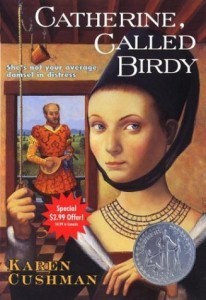 Catherine Called Birdy by Karen Cushman is a great read for so many reasons that it’s difficult to know what to praise first. I think its greatest success, though, lies in making historical fiction amusing as well as accurate. The voice is uniquely fresh and unfettered and, well, earthy. It startles and grabs the reader immediately. The setting is Medieval England but the romantic façade present in most fiction of this period has been peeled away to reveal the reality of life at that time, even among those who were considered well-off, as Birdy was as the daughter of a minor nobleman. The story is told in diary entries and makes casual references to farts and flea bites and chamber pots, body odors, and tooth-loss, all of which were inescapable facts of her daily life. Another fact of the time was a father’s right to marry off his daughter to whomever he chose. Catherine Called Birdy is a realistic yet humorous take on the traditional once-upon-a-time tales, showing one spunky heroine’s desperate attempts to avoid being married off to the men her father chooses for her. It was published in 1994, and won the Newbery Honor award.
Catherine Called Birdy by Karen Cushman is a great read for so many reasons that it’s difficult to know what to praise first. I think its greatest success, though, lies in making historical fiction amusing as well as accurate. The voice is uniquely fresh and unfettered and, well, earthy. It startles and grabs the reader immediately. The setting is Medieval England but the romantic façade present in most fiction of this period has been peeled away to reveal the reality of life at that time, even among those who were considered well-off, as Birdy was as the daughter of a minor nobleman. The story is told in diary entries and makes casual references to farts and flea bites and chamber pots, body odors, and tooth-loss, all of which were inescapable facts of her daily life. Another fact of the time was a father’s right to marry off his daughter to whomever he chose. Catherine Called Birdy is a realistic yet humorous take on the traditional once-upon-a-time tales, showing one spunky heroine’s desperate attempts to avoid being married off to the men her father chooses for her. It was published in 1994, and won the Newbery Honor award.
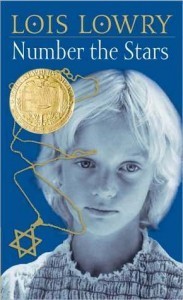 Number the Stars by Lois Lowry, is a frank yet tender look at a young girl’s experiences during the German occupation of Denmark in 1943. Ten-year-old Annemarie misses life as it used to be before the German soldiers came, and she’s frightened by their ominous presence everywhere with their menacing guns and scowls. They pose a threat to everyone but especially to the Jewish members of the community, who are taken away family by family and never heard from again. Annemarie’s best friend Ellen is Jewish and Number the Stars is the story of how Annemarie’s family risks everything to protect her, taking Ellen into their home and pretending she is a member of their family. Fear is never more than a heartbeat away in this realistic story of friendship and human kindness triumphing over evil. Published in 1989, Number the Stars won the Newbery Award for children’s fiction.
Number the Stars by Lois Lowry, is a frank yet tender look at a young girl’s experiences during the German occupation of Denmark in 1943. Ten-year-old Annemarie misses life as it used to be before the German soldiers came, and she’s frightened by their ominous presence everywhere with their menacing guns and scowls. They pose a threat to everyone but especially to the Jewish members of the community, who are taken away family by family and never heard from again. Annemarie’s best friend Ellen is Jewish and Number the Stars is the story of how Annemarie’s family risks everything to protect her, taking Ellen into their home and pretending she is a member of their family. Fear is never more than a heartbeat away in this realistic story of friendship and human kindness triumphing over evil. Published in 1989, Number the Stars won the Newbery Award for children’s fiction.
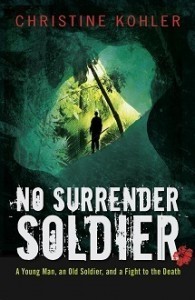 No Surrender Soldier by Christine Kohler (2014 from Merit Press) is a unique and beautifully written novel of a boy’s coming of age on the island of Guam in 1972 and a Japanese soldier who–afraid to surrender at the end of World War II for fear he’d be tortured–has been hiding underground in the jungle for 28 years. Told from the alternating points of view of teenaged Kiko and soldier Seto, the two would at first seem to have little in common. But they will make life-long impressions on each other, just as No Surrender Soldier will make life-long impressions on its readers. I cannot recommend this book highly enough. For ages 12 and up.
No Surrender Soldier by Christine Kohler (2014 from Merit Press) is a unique and beautifully written novel of a boy’s coming of age on the island of Guam in 1972 and a Japanese soldier who–afraid to surrender at the end of World War II for fear he’d be tortured–has been hiding underground in the jungle for 28 years. Told from the alternating points of view of teenaged Kiko and soldier Seto, the two would at first seem to have little in common. But they will make life-long impressions on each other, just as No Surrender Soldier will make life-long impressions on its readers. I cannot recommend this book highly enough. For ages 12 and up.
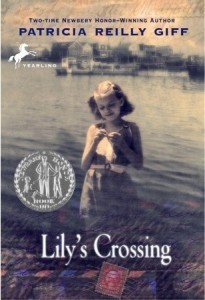 Lily’s Crossing by Patricia Reilly Giff was published in 1997 and is another Newbery Award winner. The story takes place in the summer of 1944, at the peak of World War II. Summer, usually the highlight of Lily’s year because she and her father and grandmother leave New York City behind and head to their cottage on Rockaway beach, is a sad occasion this year because Lily’s father recently left to join the fighting in Europe. But she makes an unexpected friend in a young war refugee named Albert and her summer brightens considerably. Unfortunately, a lie Lily tells Albert could put his life in real danger. A memorable coming of age story with timeless appeal for readers age 8 and up.
Lily’s Crossing by Patricia Reilly Giff was published in 1997 and is another Newbery Award winner. The story takes place in the summer of 1944, at the peak of World War II. Summer, usually the highlight of Lily’s year because she and her father and grandmother leave New York City behind and head to their cottage on Rockaway beach, is a sad occasion this year because Lily’s father recently left to join the fighting in Europe. But she makes an unexpected friend in a young war refugee named Albert and her summer brightens considerably. Unfortunately, a lie Lily tells Albert could put his life in real danger. A memorable coming of age story with timeless appeal for readers age 8 and up.
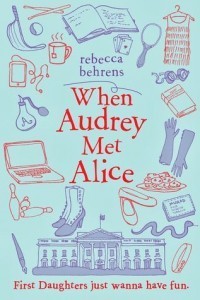 When Audrey Met Alice by Rebecca Behrens is a new novel for ages 8-12 (from Sourcebooks). It criss-crosses the line between contemporary and historical fiction when the main character, Audrey—a new presidential daughter—finds the hidden diary of Alice Roosevelt under a loose floorboard in the White House. Audrey soon discovers that although the time periods are different, the experience of being a First Daughter hasn’t changed all that much since Alice Roosevelt’s day. It’s just not a normal life. Nothing—not even ordering a pizza—is easy. And she’s expected to be on her best behavior all the time. Then there’s the matter of political hot topics and occasional disappointment in one’s presidential parent (in this case Audrey’s mother), who doesn’t follow through right away on issues she’d committed to supporting during her election. There’s lots for readers to think about long after they’ve enjoyed this lively and well-researched middle grade novel.
When Audrey Met Alice by Rebecca Behrens is a new novel for ages 8-12 (from Sourcebooks). It criss-crosses the line between contemporary and historical fiction when the main character, Audrey—a new presidential daughter—finds the hidden diary of Alice Roosevelt under a loose floorboard in the White House. Audrey soon discovers that although the time periods are different, the experience of being a First Daughter hasn’t changed all that much since Alice Roosevelt’s day. It’s just not a normal life. Nothing—not even ordering a pizza—is easy. And she’s expected to be on her best behavior all the time. Then there’s the matter of political hot topics and occasional disappointment in one’s presidential parent (in this case Audrey’s mother), who doesn’t follow through right away on issues she’d committed to supporting during her election. There’s lots for readers to think about long after they’ve enjoyed this lively and well-researched middle grade novel.
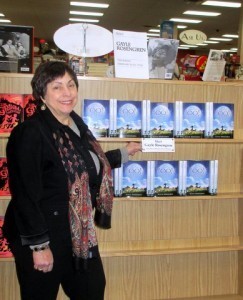 About the Author: Gayle grew up in Chicago. Gayle worked as a children’s and young adult librarian at a public library for several years in the late 1980s and early 1990s, enthusiastically sharing her love of books with young people. Gayle eventually moved to Wisconsin, but by then she was a mother with three children. She worked in the reference library, and later as a copyeditor, at American Girl. During this time period she published short stories for children in Cricket, Ladybug, Jack and Jill and Children’s Digest magazines. Now Gayle writes full-time in her home just outside of Madison, Wisconsin, where she lives with her husband, Don, and slightly neurotic rescue dog, Fiona. She is living her dream, she says, writing books she hopes will make the same difference in children’s lives as her favorite books and authors made in hers. What the Moon Said is her first novel.
About the Author: Gayle grew up in Chicago. Gayle worked as a children’s and young adult librarian at a public library for several years in the late 1980s and early 1990s, enthusiastically sharing her love of books with young people. Gayle eventually moved to Wisconsin, but by then she was a mother with three children. She worked in the reference library, and later as a copyeditor, at American Girl. During this time period she published short stories for children in Cricket, Ladybug, Jack and Jill and Children’s Digest magazines. Now Gayle writes full-time in her home just outside of Madison, Wisconsin, where she lives with her husband, Don, and slightly neurotic rescue dog, Fiona. She is living her dream, she says, writing books she hopes will make the same difference in children’s lives as her favorite books and authors made in hers. What the Moon Said is her first novel.
September 30, 2014
Five Tools to Clear Your Mind and Write by Rochelle Melander
With all that’s been going on this month, I’ve done little more than skip from task to task, crossing items off my mental to-do list. When I take my daily walk—time I usually set aside to plan my writing day—I’m often strategizing how to fit it all in. I’m not alone. I hear from many of my clients and colleagues that in the spaces between work, life, and social media, they have little energy to think about writing let alone write.
I’m convinced that writers need distance from the dreck of daily life to ponder big ideas or fictional worlds and write about them. In leadership studies, this is called balcony space—when leaders escape from work demands and look at the big picture, much like they’re on a balcony. When I’ve written about balcony space in the past, I’ve recommended taking time away to vision the future and set goals.
But writers need more than a day away from the office twice a year. We need regular open space to imagine and dream. Here are five ways to free your brain to play:
1. Dump brain clutter. Most of us can’t think about writing because we’re strategizing how to juggle work and home or worrying about any number of real and imagined disasters. We need to clear out the brain clutter.
Try this: Each morning or evening (or both), jot down all of your worries, thoughts, and tasks. Just get it out of your head and onto paper (virtual or tangible). If there are tasks to complete, add them to your schedule so you know when you’ll complete them.
2. Clear physical clutter. I have too much stuff. Maybe you do, too. It’s hard to think big thoughts when we’re dealing with straightening, cleaning, and arranging our junk.
Try this: Take a look at your living and work space: what could you let go of that would open up space and give you more room to think?
3. Automate decisions. Several years ago, I read a book by Dr. Oz that recommended automating one’s meals—eating the same rotation of healthy foods to avoid temptation (No, I’m not going to eat the seven layer pizza for lunch. I’ve packed a beautiful salad.) Anytime we can automate our decisions—what to wear, what to eat, when to write—we free up brain space to think about writing.
Try this: Take a look at your life: what practices could you automate to save thinking time?
4. Time Travel. Last week, I visited my favorite hair salon. Most clients are in their 80s and 90s. One read a paperback book. Another chatted with her hairdresser. No one had a phone out—including me. And for the first time in a long while, I was able to think.
Try this: Choose a few tasks and do them like it’s 1975. Ride in the car without your phone. Take a walk without your MP3 player. Write with a pen and paper.
5. Go wild. Psychologists have found that being in nature resets our ability to pay attention.
Try this: You don’t have to live in the wild to get connected to the wilderness around you. Go outside. Take a walk in the park. Dig in your garden. Watch the birds or the bugs.
Your turn: How do you free up brain space to think?
September 23, 2014
Advice from the Masters: Keep Writing by Rochelle Melander
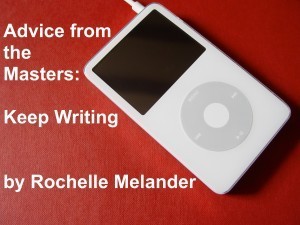 Our summer ended with a trio of crises. The car stalled, and despite multiple expensive trips to the dealer, we couldn’t fix it. The dog ate a pile of stones, and even though we tried to save the little guy, he didn’t make it. Then the sewer backed up into our basement, filling it with water and then sewage. Thankfully, the local roto-rooter® guy cleared the drain, and my sweet husband took on the job of cleaning up.
Our summer ended with a trio of crises. The car stalled, and despite multiple expensive trips to the dealer, we couldn’t fix it. The dog ate a pile of stones, and even though we tried to save the little guy, he didn’t make it. Then the sewer backed up into our basement, filling it with water and then sewage. Thankfully, the local roto-rooter® guy cleared the drain, and my sweet husband took on the job of cleaning up.
In the midst of all this, I’ve been writing. For the most part, writing is a respite for me—the place where I go to deal with the figurative and literal crap of daily life. But in the past few months, I’ve had my share of writing challenges as well. Often, it seems like I’ve barely pushed “send” on a query, and a rejection pops into my inbox. Yikes.
Over the weekend, I realized I needed someone to tell me to keep writing. That someone showed up in my Monday morning workout—in the form of my playlist. We all know that exercise improves our mental and physical health. But did you know that listening to music also makes you happier? Research by the University of Missouri shows that listening to upbeat music can immediately lift our mood and, over a two-week period of regular listening, increase our general feelings of well being.
Sometimes life sucks—so we write. But the writing life isn’t always easy. If you’re a writer, you’re going to face days when the work goes poorly. You’ll have days when you’re so busy writing, you barely have time to eat. But you’ll have other days when there’s no work, and you wonder if anyone will pay you for your work again. You’ll get accepted but you’ll also get rejected more times than you can imagine. While you’ll have some fans, other people will hate what you write, or worse—ignore it. You may even lose friends over the endeavor. In the moments when you want to give up or give in, take a walk and listen to my writing inspiration playlist. These are some of the songs that keep me writing. I hope they remind you to, “follow your arrow wherever it points” (Follow Your Arrow by Kacey Musgroves).
Believe in yourself.
Gold by Britt Nicole
And don’t let anybody tell you that you’re not enough
Yeah there are days that we all feel like we’re messed up
But the truth is that we’re all diamonds in the rough
You’ve got stories to share with the world.
Unwritten by Natasha Bedingfield
Live your life with arms wide open
Today is, where your book begins
The rest is still unwritten, Yeah
Not sure what to write next? Listen to your gut.
Compass by Lady Antebellum
So let your heart, sweet heart
Be your compass when you’re lost
And you should follow it wherever it may go
Let Your Soul be Your Pilot by Sting
When the map you have leads you to doubt
When there’s no information
And the compass turns to nowhere that you know well
Let your soul be your pilot
Rejected? Try again.
Fight Outta You by Ben Harper and the Innocent Criminals
Don’t believe the headlines,
check it for yourself sometimes,
don’t let them take the fight outta you
Do It Anyway by Martina McBride
You can chase a dream
That seems so out of reach
And you know it might not ever come your way
Dream it anyway
I Dare You to Move by Switchfoot
I dare you to move
I dare you to lift yourself up off the floor…
Like today never happened
We need you and your story.
Let Your Light Shine by Keb’ Mo’
No one else could do what you do.
Get out of the way
Let your light shine.
Your turn: What songs inspire you to write? Leave your suggestions in the comments below!
#Writers--What #songs inspire you to #write?
Click To Tweet - Powered By CoSchedule
September 16, 2014
Listening for Voices by Rochelle Melander
 Many people hear voices when no one is there. Some of them are called mad and are shut up on rooms where they stare at the walls all day. Others are called writers and they do pretty much the same thing. —Margaret Chittenden
Many people hear voices when no one is there. Some of them are called mad and are shut up on rooms where they stare at the walls all day. Others are called writers and they do pretty much the same thing. —Margaret Chittenden
On Saturday, I attended a mystery writing conference (MWA-University). Sara Paretsky spoke about how her best books emerged from fallow periods, when she had the time to listen for the voices of her characters.
In Walking on Water, Madeleine L’Engle wrote about the value of listening to our work:
And sometimes when we listen, we are led into places we do not expect, into adventures we do not always understand. (p. 22)
I’ve written repeatedly about how writers need idle time to develop their ideas. Lately, I’ve become aware of how little time I have to simply be idle. It’s a rare moment when I’m not working, writing, talking, texting, coaching, caring, teaching, reading, watching, or surfing. And when I do have a free moment, I tend to use it to check one of my digital devices. I’m not alone. Consider these stats:
+The average user checks their phone 110 times a day.
+Americans spend 16 minutes of every hour on social networks.
+Americans spend 11 hours a day with digital media.
L’Engle, writing in the late 70s before the onset of the digital life, said it like this:
When I am constantly running there is no time for being. When there is no time for being there is no time for listening. (Walking on Water, p. 13)
Writers, if you’re struggling to find new ideas, develop your story, hear a character’s voice, describe a setting, or simply get words on paper, you might need some idle time. Turn off your devices and try:
+Taking a walk
+Driving
+Riding in a train or bus
+Sitting still
+Chopping vegetables
+Daydreaming
A final word of advice: Keep pen and paper close by, in case the muse—or your next protagonist—speaks to you!
September 9, 2014
Three Hurdles to Writing Your Book (And How to Overcome Them) by Rochelle Melander
 He would like to be capable of writing as he thinks, quickly, without effort, the word as agile and dynamic as athletes in a race, jumping over hurdles, one after the other, go, go, go, flying towards the finishing post, faster than the disgust limping behind him.
He would like to be capable of writing as he thinks, quickly, without effort, the word as agile and dynamic as athletes in a race, jumping over hurdles, one after the other, go, go, go, flying towards the finishing post, faster than the disgust limping behind him.
—Filippo Bologna
We desperately yearn to write that book, to become a published author, to find our passionate readers—and yet we don’t. Day after day flies by, and we do not put pen to paper. Why? Are we failures? Do we need to go back to school? Does procrastination hold us so tightly in its ugly grips that we cannot free ourselves to write even a few words a day?
Over the years, I’ve worked with many people who want to write books. I’ve noticed distinct differences in the attitudes and behaviors of people who finish books. When I examine my own writing habits, I can see why I manage to finish some projects while others languish untouched.
Last week, you wrote out your writing goals for the rest of the year. Although not all of you want to write a book—some of you have blogs, articles and poems to finish—this applies to you, too. Here are three hurdles to writing your book this year, and how to overcome them.
Hurdle One: Purpose
So you know what you want to do—write a mystery, a memoir, a self-help book. But do you know why you want to do it? Most of my procrastinating clients tell me that they have no trouble finishing an assignment for an editor or a teacher. When we puzzle over why, a variety of reasons come up from pay to punishment—you get paid to write for an editor and punished if you don’t. But the real difference is purpose: When we write for an editor, we have a purpose. Real people will read our work. When we write a novel—unless we’re under contract to a publisher—we have no idea if it will be read by anyone other than our critique group.
The Fix: We need a reason to be writing a book, a purpose beyond ourselves. Rewrite your goal and add a purpose statement:
I will write my book this year so I can teach my clients how to overcome symptoms of depression.
I will write my book this year so I can achieve my dream of becoming a children’s book author.
I will write my book this year so I can … (Add your reason here!)
Hurdle Two: Other Goals
You’d be writing the great American novel, but first you have to finish training for the marathon, planning the launch of your business, or redecorating the living room. Your big life and career goals conflict with your goal of writing a book. You don’t have the life-space or head space necessary to think big thoughts and write them down.
The Fix: Take a hard look at your life and list every single thing you’re doing that might get in the way of writing your book. Let go of one or more activities that conflict with your goal of writing. Open up time and space in your life to think and write. If letting go of one thing doesn’t help, go back to your list and choose another activity to let go of. Repeat until you’re writing regularly.
Hurdle Three: BHAG
Lots of coaches talk about the Big Hairy Audacious Goal (BHAG). I often meet writers who have BHAGS—like writing a nine-book epic fantasy series or the definitive guide to the care and feeding of rabbits. I tend to like a good ol’ BHAG myself, but the truth is: having a big hairy audacious goal is a huge hurdle to actually writing a book.
The Fix: Break down your BHAG into absurdly tiny steps. So instead of “write nine-book epic” or “write book one” or even “research characters” try something like:
+Write physical description of Mist Le Doux, the evil queen of the fairies.
When the steps are small enough to be workable, you’ll know. You’ll feel calm and able to tackle anything. And you will be writing.
Bonus Hurdle: Getting around to it. In my head, I’ve got a lot of stuff I’d like to get done—including organizing the bathroom closet, practicing yoga, and writing a few new books. I’ve even put some of these goals on my to-do list—every single week, all summer long. Clearly, I never get around to working on them.
The fix: Schedule the small steps. A to-do list isn’t enough. Get out your calendar and create a schedule. Add a time slot for each small step.
But Rochelle, you didn’t talk about …
No doubt I’ve missed a few hurdles. Maybe I’ve even missed the hurdle that trips you up the most. Don’t worry. During this month’s Write Now! Mastermind class, I’ll be talking about overcoming writer’s block, procrastination, and other hurdles that keep us from writing. If you have one that you’d like me to discuss, email me or leave a comment at the blog.
#Writers -- What hurdles do you need to overcome to #write?
Click To Tweet - Powered By CoSchedule
September 2, 2014
Set Your Writing Goals by Rochelle Melander
 When you discover your mission, you will feel its demand. It will fill you with enthusiasm and a burning desire to get to work on it. —W. Clement Stone
When you discover your mission, you will feel its demand. It will fill you with enthusiasm and a burning desire to get to work on it. —W. Clement Stone
Effective teachers enter the classroom with a set of learning objectives—information, techniques, or skills that they expect the students to learn by the end of the class. The objectives direct the daily practice, giving the teacher and the students something to work towards.
Writers need learning objectives, too. We need to vision:
*What we want our writing career to look like.
*What ideas we want to explore in our writing
*What products we want to create—poems, articles, short stories, books.
*What writing skills we want to learn.
*What additional information we want to learn.
Take time this week to imagine what you’d like to be and do in this next phase of your writing career. Then write out your learning objectives for the fall. It will help to direct your writing time. It will also guide what you read and what conferences you choose to attend. It might even ignite your passion for writing. As Stone said above, when we get our sense of mission—we are filled with “a burning desire to get to work on it.” Yes!
August 26, 2014
Review Your (Writing) Life by Rochelle Melander
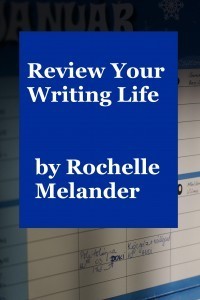 If you change nothing, nothing will change.
If you change nothing, nothing will change.
It still feels like summer, the hot and humid air leaves me breathless, desiring only to sit on the porch, drink lemonade, and read books. But the calendar reminds me that Labor Day weekend is coming up and with it, the start of school.
We might not attend school or have children to send off, but this season still calls us all to make changes, to let go of old habits and take on new projects. I can tell I’m ready for something new because over the weekend I began rearranging my office—a sure sign that I need a change.
Before I make any major change, I like to pause and consider what is. If you’re in the mood for a shift and aren’t sure what it might be, here’s a tool to help you review your life:
1. Score your life. Examine your date book for the last few months (or whatever else you use to keep track of your working life) and evaluate each item. Keeping in mind what you value and love to do, give each item a plus or minus. If something was amazingly wonderful, go ahead and give it more than one plus mark. If an activity was fun to do but didn’t pay well (or paid well but was a pain to complete), give it a plus and a minus.
2. Consider the missing. Review your goals for 2014. What had you hoped to work on this year? Perhaps you wanted to journal more or write a novel. Maybe you’d planned to start a blog or take up an exercise routine. As you look at what you’ve actually done, make a list of the activities or goals you’ve forgotten to work on.
3. Evaluate it all. Assess the results of steps one and two. Given what worked and what didn’t work, what you did and what you wished you’d done, ask yourself:
*What kind of work would I like to do less of?
*What kind of work would I like to do more of?
A note: You will have some immediate answers to these questions. Write them down and honor them. But you may also want to sit with the questions for a bit until the right answer shows up.
Your turn: If you have additional life review tools, please suggest them in the comments section below! Happy reviewing!
Resource: Last November, we did a similar exercise called The Reckoning. Check it out for more resources.
August 19, 2014
Three Tools to Boost Your Creativity by Rochelle Melander
 Logic will get you from A to Z; imagination will get you everywhere. —Albert Einstein
Logic will get you from A to Z; imagination will get you everywhere. —Albert Einstein
In 2006, I launched Dream Keepers, a writing program for at risk children and teens in Milwaukee. Since then, I’ve taught at dozens of libraries, schools, and churches. In the past year, I’ve noticed that many of the young people have difficulty imagining. When I ask them to write a scary story, they write what they’ve seen in movies and on television. When I push them to create something of their own, they stare at me like I’m from outer space.
My own ability to imagine has taken a hit in recent years, too. Too much time hooked up to the computer has made me much more likely to research than question. Research backs me up. A 2010 study done by Kyung Hee Kim, a creativity researcher at the College of William and Mary, discovered that creativity has decreased in children since 1990, along with the ability to imagine.
So how can we address the problem of our dwindling creativity? We need to practice imagining and immerse ourselves in creating. No doubt, our creative play will support our writing. If you’re up for a little fun, try these exercises:
1. Don’t look it up, make it up! Have you noticed how public wonderments have turned into competitive research sessions? You’re standing in a park talking and someone says, “I wonder what people did for fun in Milwaukee in the mid-1800s?” Then five people pull out their smart phones and race to find out first. (Actually, the answer for that, like the answer for all things Milwaukee, is easy: they drank beer.)
Your assignment: Next time you wonder, don’t pick up that phone (or tablet). Quickly make up 5-10 answers. If you’ve got time, develop one of them into a short story.
2. Play the “What If?” game. As a chronic worrier, I play the “What If?” game all the time—what if my kids flunk out of school and have to live on my couch forever, what if that chicken I ate for lunch was bad, what if I never get this book published! Far better to play the “What if” fantasy game: what if squirrels were really super intelligent and took over the world? What would life look like then?
Your assignment: Create 5-10 crazy “what if” sentences. Then take one of them and follow it to its strangest conclusion.
3. Invent it. Earlier this summer, my dog had a giant sore on his ear (I know, yuck). It stunk and worse, every time she scratched, it bled all over the house. Before we brought her in to have the sore removed, I spent a lot of time devising ways to keep her from itching it. (She can’t use the Elizabethan collar.) Believe it or not, I had lots of fun trying to invent a protective ear device.
Your assignment: Invent a solution for a pesky problem in your house. If you don’t have any problems (lucky you), get a bunch of stuff from your junk drawer and see what you can create with it.
Bonus Tips:
+Do something impractical and creative every day.
+Read about artists and inventors.
+Visit places that honor artists, inventors, scientists, and other creatives!
Your turn: How do you nurture your creativity?
August 12, 2014
Make Interruptions Work for You by Rochelle Melander
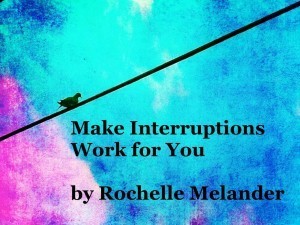 People who say it cannot be done should not interrupt those who are doing it. —George Bernard Shaw
People who say it cannot be done should not interrupt those who are doing it. —George Bernard Shaw
I don’t know about you, but I’m addicted to finishing tasks and crossing them off my to-do list. Even when I’m writing a book, I like to cross off a section or two at the end of the writing session. But guess what? Sometimes finishing a task can limit our productivity.
Psychology researcher Bluma Zeigarnik found that not finishing a task in one sitting is good—because we tend to remember the tasks we were working on when we were interrupted. So the next time we get to our desk, we can pick up where we left off. Brilliant!
Try this: Tackle one and a half sections (or two and a half or whatever). Just leave off at a juicy part!
Pro Tip: We can’t always plan interruptions—they just happen. So next time something or someone interrupts you, take time to write down a few words about what you’re writing and what you plan to do next. That will help you refocus when you get back to your desk.
August 5, 2014
Why You Need Interruption-Free Writing Time by Rochelle Melander
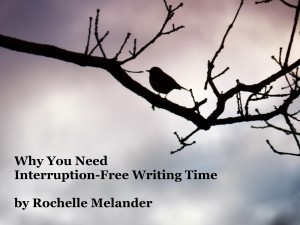 In order to understand the world, one has to turn away from it on occasion. —Albert Camus
In order to understand the world, one has to turn away from it on occasion. —Albert Camus
New research by Cyrus Foroughi, a PhD candidate out of George Mason University, suggests that small interruptions decrease our ability to write well. In two studies, participants were asked to outline and write an essay. In the first, some were interrupted at regular intervals. In the second, they were interrupted at random times. But the result was the same: those who were interrupted wrote less and scored lower than their peers.
What does this mean for you? That smart phone that keeps buzzing? The twitter feed popping up on your screen? Even the IM on Facebook? They’re killing your ability to write.
How do you overcome this? Give yourself a block of interruption-free time each day or week to write. It doesn’t have to be a whole day. It can be two hours on a Saturday afternoon, 30 minutes each morning before the rest of the family wakes up, or ten minutes before bedtime. No matter the amount of time you can grab—take it and write.
Pro tips:
+Turn off anything electronic that might interrupt you, including social media feeds and text messages.
+Decide ahead of time on a signal that your family or housemates will recognize as, “Writer at work” and leave you alone. This might be wearing a special hat or putting a “do not disturb” sign on your door.
+Get out of the house or office and write somewhere new and different.

